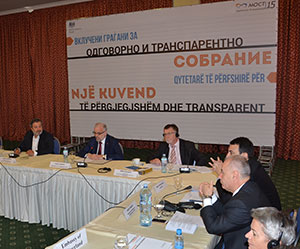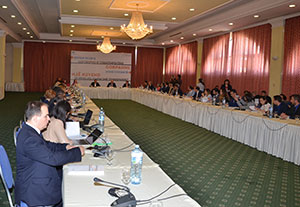 Thursday, 11 May 2017
Thursday, 11 May 2017
THE PRESIDENT OF THE ASSEMBLY, MR. TALAT XHAFERI AT CONFERENCE ON: PARTICIPATION OF CITIZENS TOWARDS RESPONSIBLE AND TRANSPARENT ASSEMBLY
Distinguished NGO representatives,
Distinguished Excellencies,
Ladies and gentlemen,
First of all, I would like to express my great pleasure that my first public appearance is before the representatives of the NGO sector and my even greater satisfaction with the topics about to be debated i.e. the role and functioning of the Assembly as a highest level body which also adopts laws. In this context the debates will include the transparency and responsibility of the Assembly, the work done by the committees and the mechanisms for participation of stakeholders.
Distinguished friends,
One of the main pillars of parliamentary democracy is the functioning i.e. the work of the Parliament as the highest legislative power, which concurrently serves another, equally important function, and that is control of executive power. In these twenty-six years of independence and parliamentary democracy, if we want to estimate how far we have come regarding the practice of parliamentary democracy we can draw two conclusions. The first, speaking metaphorically, is that the glass is half empty and the other one is that it is half full, or I would rather say that it is overflowing. Nevertheless, in our case, democracy or parliamentarism is far from the principles and standards that are considered norm in Europe and are something which, in reality, the citizens of Europe enjoy.
One of the main problems when discussing our parliamentarism and the functioning of the Assembly in general is the relationship between the parliamentary majority and the opposition. In the past period, the majority in the Parliament has always regarded the opposition as a political opponent who must be defeated, and sometimes even eliminated in political terms. In doing so, it is unfortunately forgotten that the opposition is the one thing that provides complete legitimacy of any given parliament and without an opposition we cannot talk about true parliamentarism and parliamentary democracy. I don’t mean by this that the opposition should be seen as a simple ornament for providing legitimacy to the parliament, but rather that we should accept its active role in all the processes carried out in the Assembly. It is here that I see the greatest weakness in the current practice of parliamentary democracy in our country.
On the other hand, the opposition should be aware that the parliamentary majority has to carry out and imeplement its programme since it served as the basis for citizens to give their trust to the majority to lead the country. At first glance, this may seem like an unsurpassable antagonism but it’s not. If we take a look at and if we follow the positive parliamentary practices from other European countries we will see that things are, normatively speaking, well arranged according to the Constitution, the Rules of Procedure of the Assembly as well as the Law on the Assembly, but we lack political will or political culture, if you prefer, to put everything into practice. Thus in my first address to the public as the President of the Assembly I would like to vow that I will work precisely on the aforementioned issues and challenges by acting within my constitutional and procedural competencies. Success or failure depends on all the 120 MPs sitting in the Assembly but the responsibility first and foremost falls on the parliamentary majority.
 Ladies and gentlemen,
Ladies and gentlemen,
We are all aware and we all feel that in these past two years we have been living in in a serious social and political crisis, to say the least, which was felt daily in all spheres of life and has affected every citizen. This crisis was largely a result of insufficient parliamentary oversight of the executive power. I hope that by electing me the new President of the Assembly, and therefore by completing the constitution of the Parliament and soon by forming a new government, we will create conditions for a process which will allow us, as a country and as a society, to return to the right track which leads to the creation of a functional country, with independent and functioning institutions that work, primarily, for the well-being of every citizen.
I don’t want to mention the recent violent and bloody events that occurred in the Assembly, and less so to accuse anyone or judge anyone about it. As the President of the Assembly, as a MP, and above all as a citizen I certainly cannot accept or support any type of violence. But at the same time, we should learn once and for all that we have institutions that are obligated to prevent these events from happening ever again. We also have institutions that should investigate such violence if it should occur and all those who have broken the law should be brought before courts with sole competence based on our laws and those courts should find any of us guilty or free of all charges.
Dear friends,
The return to a normal social environment which encompasses everything from respect of the principle of parliamentary democracy, the rule of law and the respect of human rights and freedoms, individual as well as collective ones, up to freedom of speech, will not happen overnight. It is a process which will take a longer period of time. What I feel is extremely positive at this moment is the fact that the parliamentary majority and the coalition transparently demonstrate this as our joint obligations which will lead us to the desired goal of Euro-Atlantic integration. And to achieve this it is not only important to accept European standards on paper or declaratively, but even more so to implement them in practice.
Here I see your role as the NGO sector where you should serve as a kind of “dog-watch” for everything happening in the society and by using all democratic methods, even peaceful protests, you should mobilize the public and citizens in a manner of speaking and thus force the political subjects and politicians to return to the right path for which they received their mandate. Here I would like to end my address, and to sincerely promise that I, as the President of the Assembly, and the Assembly as an institution will be always open to your initiatives, suggestions and everything else aimed towards strengthening parliamentary democracy and parliamentarism in the Republic of Macedonia.
Thank you for your attention.